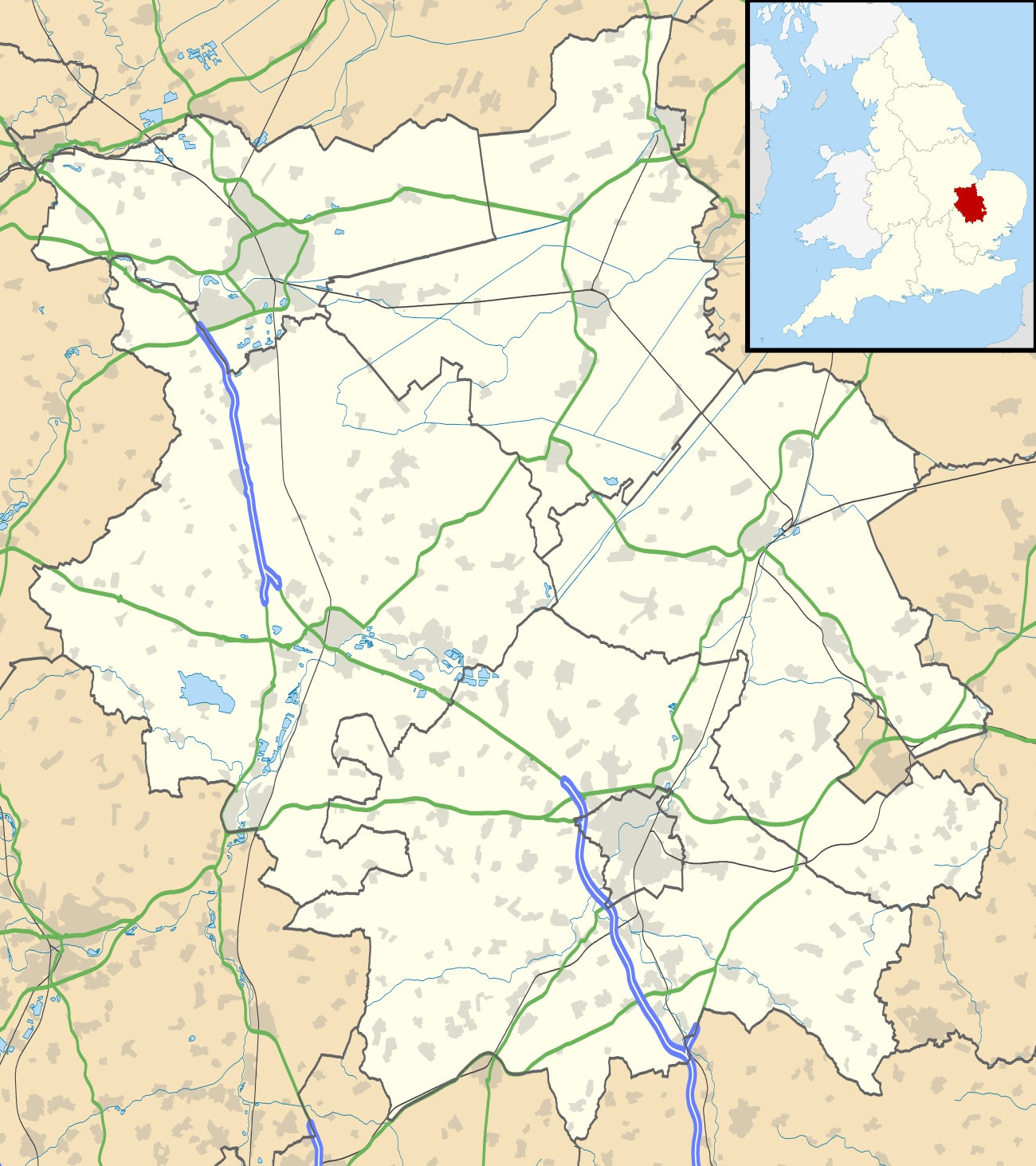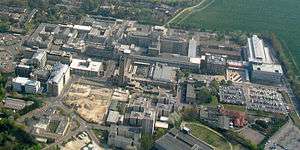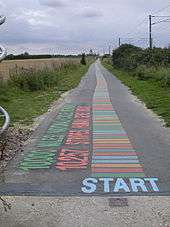Addenbrooke's Hospital
| Addenbrooke's Hospital | |
|---|---|
| Cambridge University Hospitals NHS Foundation Trust | |
|
Addenbrooke's Hospital | |
 Shown in Cambridgeshire | |
| Geography | |
| Location | Cambridge Biomedical Campus, Cambridge, England |
| Coordinates | 52°10′34″N 0°08′24″E / 52.176°N 0.140°ECoordinates: 52°10′34″N 0°08′24″E / 52.176°N 0.140°E |
| Organisation | |
| Care system | NHS |
| Hospital type | Teaching |
| Affiliated university | University of Cambridge Medical School |
| Services | |
| Emergency department | Yes - Major Trauma Centre |
| Beds | 1,000[1] |
| History | |
| Founded | 1766 |
| Links | |
| Website | http://www.cuh.org.uk |
| Lists | Hospitals in England |

Addenbrooke's Hospital is an internationally renowned[2] teaching hospital and research centre in Cambridge, England, with strong affiliations to the University of Cambridge.[3] Addenbrooke's Hospital is based on the Cambridge Biomedical Campus. The hospital is run by Cambridge University Hospitals NHS Foundation Trust and is a designated academic health science centre. It is also the East of England's Major Trauma Centre - the first in which to be operational in the UK.[4]
History
The hospital was founded in 1766 on Trumpington Street with £4,500 from the will of Dr John Addenbrooke, a fellow of St Catharine's College.[5] In 1976, the hospital moved to its present premises on the southern edge of the city at the end of Hills Road. The old building now houses the Cambridge Judge Business School, as well as Browns Brasserie & Bar.[6] A new elective care facility was procured under a Private Finance Initiative contract in 2004, It was built by Alfred McAlpine at a cost of £85 million and completed in spring 2007.[7]
Services
Addenbrooke's provides a full range of clinical services, with the exception of cardiothoracic surgery, which is provided at the nearby Papworth Hospital (due to be re-located to the Cambridge Biomedical Campus in 2017).[8] It is a designated UK Major Trauma Centre.[9] Addenbrooke's was the first regional Major Trauma Centre in England to become fully operational and was featured on the BBC documentary series 'Life Savers' in 2013.[4]
Addenbrooke's is a tertiary referral centre for a number of specialities. Of note, it is one of the UK's six liver transplant centres and performs multivisceral transplants. It is a busy regional neurosurgical centre[10][11] and has the largest neurological intensive care unit of its kind in Europe. It is also a centre of excellence for renal services, bone marrow transplantation, cleft lip and palate reconstruction, treatment of rare cancers, medical genetics, and paediatrics. Addenbrooke's is also the designated regional centre for pancreatic, biliary and liver cancer surgery and tertiary referral centre for complex pancreatitis. It has 37 operating theatres, and in addition to the neurosciences (neurosurgery and neurology) critical care unit it also has an adult, a paediatric, and a neonatal intensive care service, and several high-dependency areas (adult, paediatric, transplant, surgical, coronary care).[12] The Rosie Hospital is attached to Addenbrooke's, and provides a full range of women's and maternity services, including a midwife-led birth unit and birth pool.[13]
Addenbrooke's is an internationally renowned transplant centre. Addenbrooke's transplant surgeons have made many notable contributions to the world of transplantation, including:[14]
- The first liver transplant outside the USA (1968)
- The introduction of the immunosuppressant drug ciclosporin into clinical practice (1978)
- The pre-clinical development of the immunosuppressant drugs sirolimus and tacrolimus (1980s)
- The world’s first combined heart, lung and liver transplant, with Papworth Hospital (1986)
- The first combined liver and pancreas transplant (1988)
- The first small-bowel transplant in the UK (1992)
- The first multivisceral transplant in the UK (1994)
The East of England Ambulance Service has an ambulance station in the grounds of the hospital, and there is an NHS Blood and Transplant facility on site.
The hospital has its own helipad, located on-site. This is an important feature for the numerous air ambulances that visit - transporting patients in a critical state to the Major Trauma Centre.[15]
Transport

Bus
The campus is served by a busy bus station, located on its gateway roundabout, with up to 60 buses arriving there every hour. Addenbrooke's hospital is directly accessible from three of Cambridge's five Park and Ride sites, of which Babraham Road and Trumpington are nearest.[16] The green Park and Ride buses from either the Babraham or Milton Park and Ride stop at its main bus station, while the busway service A connects various locations around the site to Trumpington Park and Ride and the Cambridgeshire Guided Busway.[17]
Bicycle
Various cycle ways lead to Addenbrooke’s hospital and a new cycleway and footpath linking Great Shelford and Addenbrooke’s opened in August 2006, which also marks the 10,000th mile of the National Cycle Network.[18]
Car
Parking is increasingly restricted, as former car parks are being built on, and staff, patients and visitors are encouraged to travel in by bus or bike. A new multi-storey car park with 1050 spaces for visitor and patient parking and a further 63 for disabled parking was opened on 18 April 2008. There is a customer service desk and concession tickets are available for outpatients with appointments.[19]
Transport remains something of a problem due to the volume of people arriving each day – there are approximately 8,000 car movements each day, but only 3,200 car parking spaces available (as of March 2004). With three proposed developments around the hospital including an extension of the hospital site itself and two residential developments traffic is expected to increase considerably. For this reason work for a new access road from Hauxton Road in Trumpington to Addenbrooke's Hospital began in July 2007. The £25million new road opened in October 2010 and provides direct access from the M11 to the Cambridge Biomedical Campus, home to the hospital.[20] It is expected to handle up to 25,000 journeys per day when nearby residential developments are complete. To avoid the route becoming a rat run for access to other areas of Cambridge, it is fitted with Automatic Number Plate Recognition cameras to monitor traffic entering and leaving the site without stopping, and the police have power to issue Fixed Penalty Notices to drivers who are not authorised to use the route.[21]
Open days
The hospital holds a free open day to allow members of the public to visit areas of the hospital which would usually be inaccessible. The tours include visits to the basement service corridors, the hospital's mortuary, the pathology laboratories, the hospital roof, and one of the operating theatres. In March 2016, over 5,000 visitors attended the event.[22]
Fundraising
Addenbrooke's Charitable Trust (ACT) is the independent registered charity for Addenbrooke's Hospital and its associated hospitals. Its aim is to support and promote the work of Addenbrooke's for the benefit of patients and staff, by raising extra funds to enhance services, facilities and research.[23]
Incidents
In 2011 Addenbrooke's Doctors placed a do not resuscitate instruction on a patient's notes without consultation with either the patient or the family. The patient later died, and following a court case in 2014 Addenbrooke's was found to have acted unlawfully in denying the patient life saving treatment.[24]
In 2012, Dr Narinder Kapur, consultant neuropsychologist and Head of the Neuropsychology Service won a case of unfair dismissal against Cambridge University Hospitals NHS Foundation Trust. Dr Kapur was a whistleblower who raised patient safety concerns, such as the use of unqualified staff in clinics, concerns that were later vindicated by an internal report. Dr Kapur subsequently set up a website for whistleblowers, providing resources and advice on whistleblowing, patient safety and professionalism.[25]
In 2015 Addenbrooke's doctor Myles Bradbury was jailed for 22 years for abusing 18 boys at the hospital, between 2009 and 2013.[26]
In April 2016 Addenbrooke's was criticised for the treatment of Prof. Sir David J.C. Mackay. Mackay was unable to sleep, being kept awake by noisy staff, excessive heating, lights, and loud machinery that exceeded World Health Organization guidelines.[27] Mackay was reported to be in tears, and died six days later.[28]
See also
References
- ↑ "Facts and figures - Cambridge University Hospitals". www.cuh.org.uk.
- ↑ "Cambridge University Hospitals NHS Foundation Trust (CUH) - The Shelford Group". shelfordgroup.org.
- ↑ Boffey, Daniel (28 April 2012). "NHS trust plans to become next big name in luxury hotels". The Observer. Guardian Media Group. Retrieved 18 November 2014.
- 1 2 "Addenbrooke's stars in TV series". Cambridge News. Local World. 12 June 2013. Archived from the original on 23 September 2015. Retrieved 18 November 2014.
- ↑ "History of Addenbrooke's and the Rosie". Addenbrooke's Archives. Cambridge University Hospitals. Retrieved 9 June 2008.
- ↑ "Judge institute, Cambridge". www.johnoutram.com. Retrieved 8 February 2018.
- ↑ "Clinical and research centre reaches milestone". University of Cambridge. 7 November 2005. Retrieved 8 February 2018.
- ↑ "Papworth heart and lung specialist hospital to move". BBC News. 3 December 2013. Retrieved 18 November 2014.
- ↑ "Emergency and urgent care services". NHS Choices. Retrieved 18 November 2014.
- ↑ O'Leary, Ronan (17 July 2014). "Neurosciences and Trauma Critical Care Fellowships in Cambridge". NCCU Education. Retrieved 18 November 2014.
- ↑ "Ward A2 - Neurosciences critical care unit (NCCU)". Cambridge University Hospitals. Retrieved 18 November 2014.
- ↑ "Theatres | Cambridge University Hospitals". Cuh.nhs.uk. Retrieved 2018-07-29.
- ↑ "Giving birth at the Rosie birth centre". The Rosie Hospital. Cambridge University Hospitals. Retrieved 18 November 2014.
- ↑ "History of transplantation at Addenbrooke's". Addenbrooke's Hospital. Cambridge University Hospitals. Retrieved 18 November 2014.
- ↑ "East Anglian Air Ambulance | Helipad opens" (PDF).
- ↑ "Park & Ride". Cambridge University Hospitals. Retrieved 18 November 2014.
- ↑ "Cambridgeshire Guided Busway – Information About the Scheme" (PDF). Cambridgeshire County Council. Archived from the original (PDF) on 28 May 2008. Retrieved 9 June 2014.
- ↑ "Cycleway route to hospital". Cambridge Evening News. Local World. 3 June 2014. Archived from the original on 19 October 2015. Retrieved 22 July 2007.
- ↑ "New Addenbrooke's multi-storey car park opens". Addenbrooke's Hospital. Cambridge University Hospitals. 17 April 2008. Archived from the original on 29 August 2008. Retrieved 18 November 2014.
- ↑ "Addenbrooke's Hospital access road officially opens". BBC News. 27 October 2010. Retrieved 18 November 2014.
- ↑ Stone, Tim. "No shortcut at Addenbrooke's access road". Tim Stone. Association of Liberal Democrat Councillors. Archived from the original on 2012-07-28.
- ↑ "Open day - Cambridge University Hospitals". www.cuh.org.uk.
- ↑ Charity Commission. Addenbrooke's Hospital, registered charity no. 1048868.
- ↑ Roberts, Michelle (17 June 2014). "Legal duty over resuscitation orders" – via www.bbc.co.uk.
- ↑ "ABetterNHS.com".
- ↑ "Paedophile doctor breaks silence". 13 February 2015 – via www.bbc.co.uk.
- ↑ Knapton, Sarah (15 April 2016). "Cambridge professor reduced to tears by noisy hospital before death" – via www.telegraph.co.uk.
- ↑ 15 April 2016 (2016-04-15). "Acclaimed expert on energy and engineering Sir David MacKay dies aged 48". Businessgreen.com. Retrieved 2018-02-09.
External links
| Wikimedia Commons has media related to Addenbrooke's Hospital. |